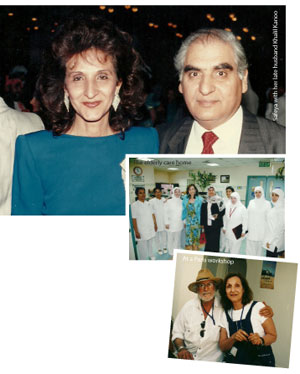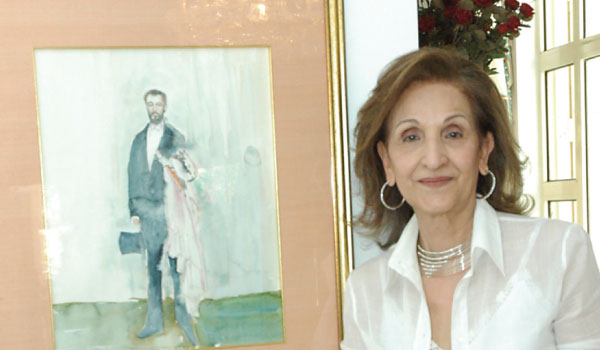Safeya Kanoo is a woman of positive influence and meaning. Woman This Month speaks to the long-time philanthropist and prolific artist.
 Safeya Kanoo has never needed a title to define who she is. Unassuming and quite modest of her achievements, her output as an artist and the numerous awards she has garnered for her charity initiatives in Bahrain speak louder than she ever has.
Safeya Kanoo has never needed a title to define who she is. Unassuming and quite modest of her achievements, her output as an artist and the numerous awards she has garnered for her charity initiatives in Bahrain speak louder than she ever has.
Over the years, her steadfast generosity has resulted in the two major health care initiatives in the Kingdom. She’s the patron of the 20-bed health care home for elderly ladies, the Safeya Kanoo Trust Clinic in Muharraq.
In 2006, she built the Paediatric Oncology Ward for treatment of children with cancer at the Salmaniya Medical Complex. Dedicated to the memory of her late husband, Abdulla Khalil Kanoo, the unit has a six-bed ward and is equipped with a surgical room, a medical lab and a clinic for daily checkups. She has added a cheery playroom, complete with bright murals, stuffed toys, television screens and computers.
A recipient of many awards from the government, Safeya has most recently been honoured by the Good Word Society under Shaikh Isa bin Ali Al Khalifa in recognition of her contribution to the local community in Bahrain. At her serene home overlooking the Tubli Bay, Safeya talks about her twin passions — art and philanthropy — which have imbued her life with purpose and meaning.
Woman This Month (WTM): Have you received any formal training in art?
Safeya Kanoo (SK): Not really, I was a self-learner from the beginning. I became interested in the works of Monet and Dali and studied their techniques from books. I was working with oil paint and later experimented with watercolours, doing pieces on landscapes and nature. As I got more immersed in painting, I decided to take short courses in art in Rome and Paris, mostly in the form of two- or three-month workshops. That’s the extent of my formal training.
WTM: Tell us about your daily routine as an artist.
SK: Well, inspiration tends to come in a flash and I quickly start working when it does. When I’m travelling, I make a lot of sketches to capture scenes of local colour. At home, I like to begin early in the morning. Soon after the morning prayers, I settle down to paint from 4-5am, my most productive hour. I forget everything else when I’m working. My room overlooks the sea, which provides wonderful inspiration for such pursuits.
WTM: How has your work shaped you over the years?
SK: I started out as a school girl, doing basic sketches. As I became more confident, I started experimenting with more complex forms using acrylic paint and charcoal. When my husband passed away, I was heartbroken. More than anything, Abdulla had been a true friend. During those difficult times, painting was like therapy for me, allowing me to create and inhabit new worlds and find happiness there. I believe creativity has been God’s gift to me.
WTM: You’ve produced hundreds of paintings over the years. Have you considered exhibiting your work?
SK: I think it’s been 20 years since I’ve last shown my work. In recent years, whenever people have asked me, I refused because I can’t dream of selling my work. My paintings are like my children; I cannot part with them. However, there is now pressure from my friends and I am considering holding an exhibition. But again, it’ll only be a viewing opportunity. I won’t be putting anything up for sale.
WTM: Tell us about your engagement in community projects.
SK: I used to spend a lot of time with a group of elderly ladies and widows in Muharraq, talking about their lives and the old days in Bahrain. I realised how worried they were about their future and then the idea of the elderly care home came up. Every week, I spend one day with them at the centre. If I can’t make it because I’m travelling, they complain that they missed me!
The idea for the children’s ward came later. I’ve always loved children and like to take care of them even though I don’t have children of my own. At Salmaniya, I feel sad when I think of them suffering at such a tender age, but spending time with them gives me happiness and I try to be strong for their sake.
WTM: What other forms do you see your community work taking?
SK: I’ve built a mosque in Tubli but I want to add a Quran recitation centre in the same neighbourhood. There are not many places around here where you can learn to do this in the prescribed manner. The centre will have an experienced teacher to train beginners. I have some other charity projects in mind, but I prefer not to make any announcements in advance. Let it be a surprise until it materialises.
WTM: What is your next step in the artistic sphere?
SK: I have too many paintings stacked up at home. Some of these are getting spoilt because I’ve run out of space to display them. I’m thinking of having a studio cum art gallery at a suitable location in Bahrain. Again, I make no prior promises. When it comes, let the work speak for itself.


































